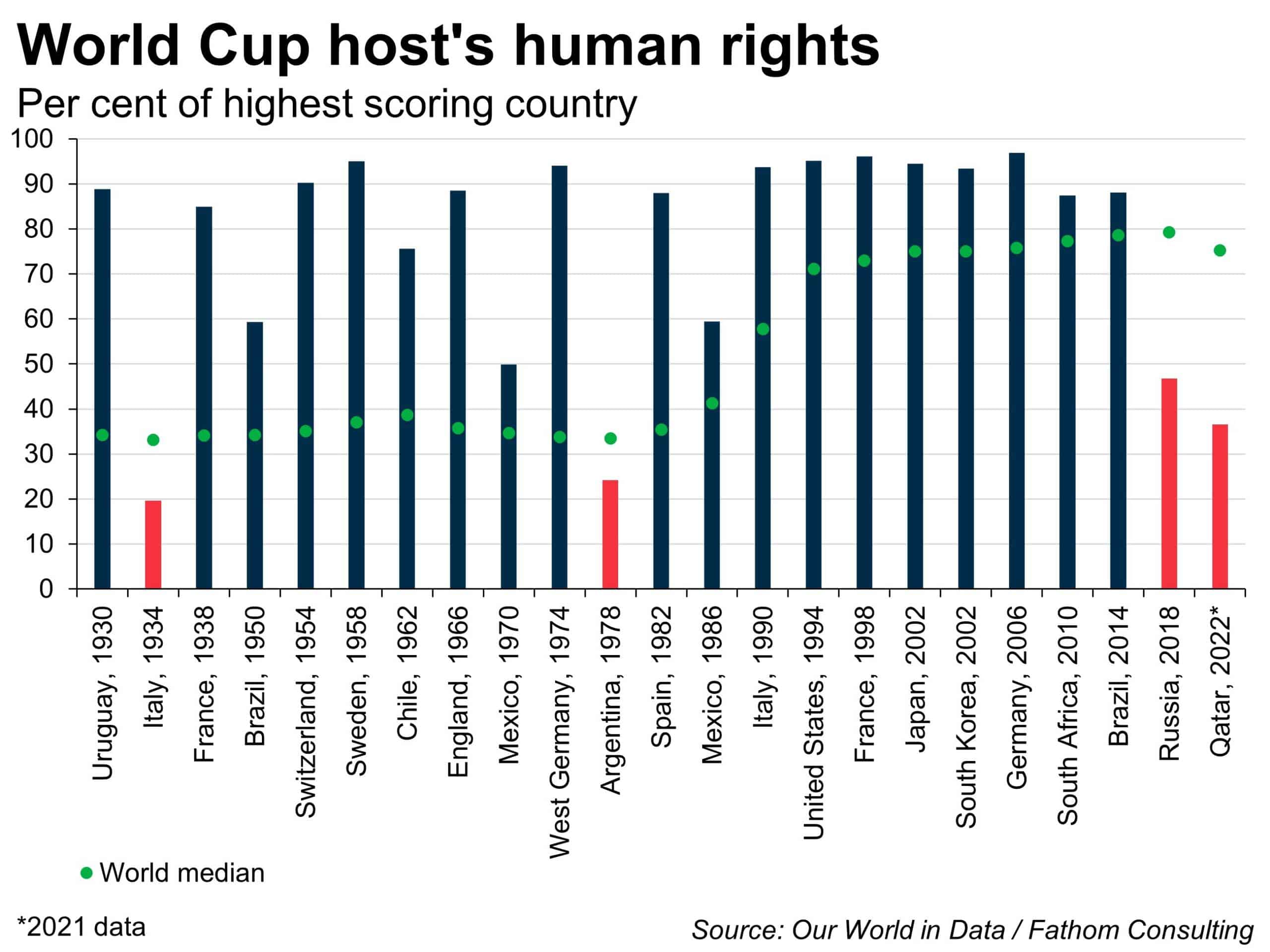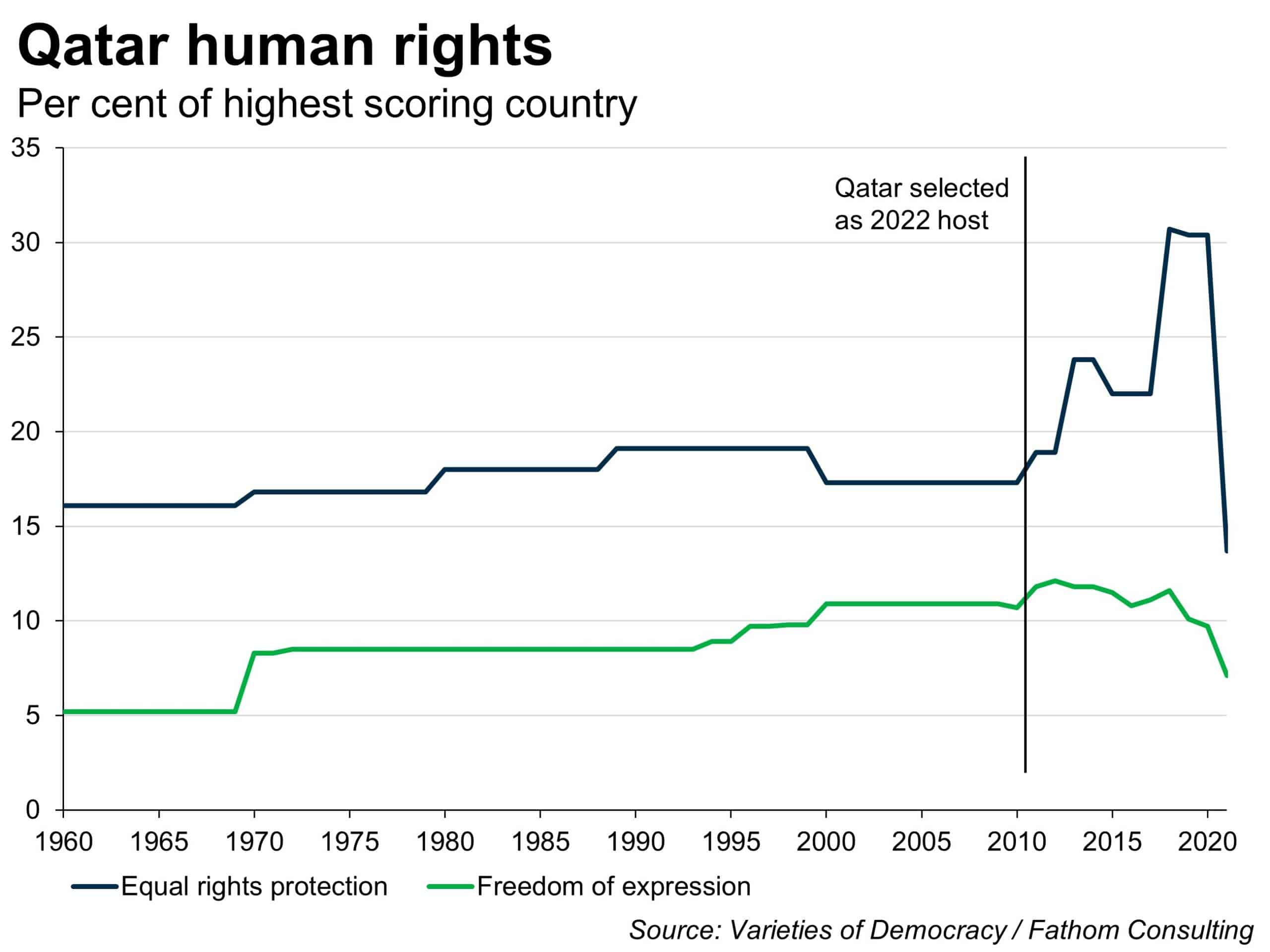A sideways look at economics
There’s no event that brings people from around the world together quite like the World Cup. In contrast to other big international tournaments, there seems to be a tangible chance of success for all teams rather than a fight between the largest and richest. This is perhaps more evident than ever in this year’s tournament, with Saudi Arabia beating one of the favourites, Argentina, while Japan secured a win over four-time champions Germany. The event is also a chance for the host to showcase all their country has to offer, promoting themselves on the international stage and allowing others to become immersed in their culture: all fostered by the commonality of football. This World Cup, however, has been striking in how divisive these cultural differences can prove to be, sparking heated debates about the extent of tolerance.
From the start Qatar was an eyebrow-raising pick to host the World Cup. Initial concerns were directed at the extreme temperatures a Qatari summer would inflict on the players, leading to the delay until winter. Focus then shifted to the reportedly brutal conditions workers were facing as construction of the stadiums was under way. Then finally, as the build up to the tournament commenced, attention grew on Qatar’s human rights record.
World Cup hosts have historically had better human rights than the average country of the time. Out of the 23 host countries, there have been only four whose citizens had weaker freedoms than the world median, according to data from Our World in Data. These four were: Italy in 1934 (under the fascist rule of Mussolini), Argentina in 1978 (two years after a military junta overthrew the world’s first female president), Russia in 2018 (four years after its annexation of Crimea) — and finally Qatar in 2022. In fact, never in the history of the tournament has the host country lagged so far behind the world median as Qatar.

Many in the West are hoping the tournament will bring about lasting liberal changes to the country and region. A strong argument can be made that without this World Cup, and the resulting international pressure, change would be much slower. Data suggest that, in the ten years following a World Cup, the host’s civil liberties (a score expressed as a percentage of the maximum score) tend to increase by 22% on average. Sounds good, right? Well, not as good when compared to the 21% increase the average country experiences over ten years. However, when looking only at the hosts which had the worst scores at the time of their World Cup (bottom 25th percentile), the increase was almost 90% in the following decade. Whether or not the World Cup was a direct source of this change, it has undoubtedly brought international attention to issues in these countries that would otherwise have carried on unaddressed.
Western criticism of the choice of host was recently attacked by FIFA president Gianni Infantino. “How many of these Western companies, who earned millions and millions from Qatar, addressed the rights of migrant workers with the authorities?” he asked. FIFA is keen to stress that the event can be a catalyst for progress, and that Qatar has made significant steps as a direct result of the tournament – steps that it is unlikely otherwise to have taken. They point to reforms to the ‘kafala’ system which has been used to repress millions of migrant workers, new minimum wages and increased worker safety measures. Tolerating Qatar and giving the country centre stage in the international community has, in FIFA’s view, created significant change.
While these nominal reforms are hard to criticise, it is their enforcement that is key to their success, and this is difficult to track. Data from Varieties of Democracy would agree with FIFA that significant progress was made after Qatar was selected as host for the 2022 World Cup. However in 2021, they reported that all this progress ‒ and more ‒ had been lost. A similarly disheartening drop was seen in their measure of Qatar’s freedom of expression.

Other commentators argue that lasting change isn’t achieved through tolerating intolerance. They contend that by accepting these inequalities, you can legitimise them. So instead of tolerating Qatar’s social and cultural inequalities, the international community should be taking steps to boycott them. Of course, isolating a country can worsen the lives and freedoms of its citizens, at least in the short term. An example of this is modern-day Russia, whose people are seeing a clampdown in freedoms as international isolation, resulting from the war in Ukraine, grows. But this strategy has a proven track record in achieving its objectives eventually. Apartheid South Africa was isolated increasingly from the 1960s, both economically and politically. This included sporting boycotts from the World Cup, Olympics and Commonwealth Games. By the early ‘90s the apartheid government had collapsed: a collapse that Nelson Mandela said “there is no doubt” was helped by the sanctions.
If apartheid South Africa had instead been accepted, would change have happened? Tolerance is a cornerstone of modern western ideology, but tolerance should surely have a limit. Philosopher Karl Popper described this dilemma as the paradox of tolerance: “If we extend unlimited tolerance even to those who are intolerant, if we are not prepared to defend a tolerant society against the onslaught of the intolerant, then the tolerant will be destroyed, and tolerance with them”.